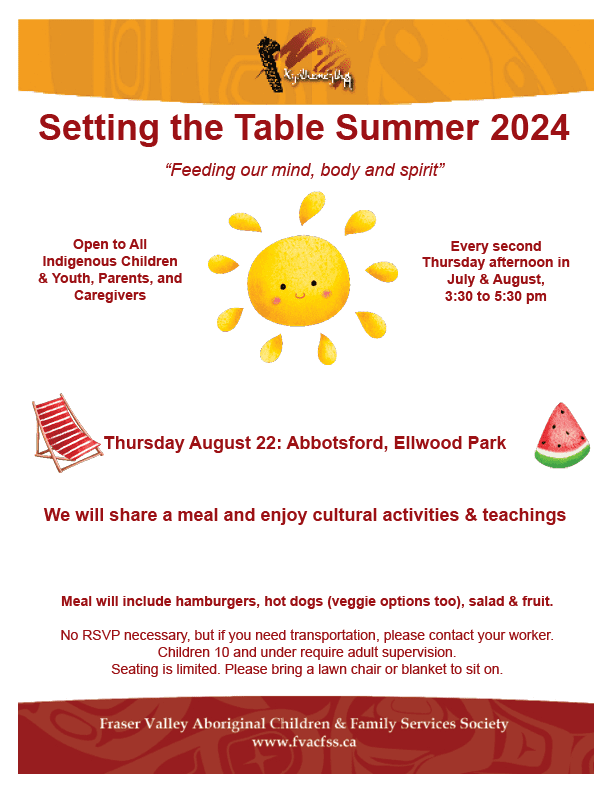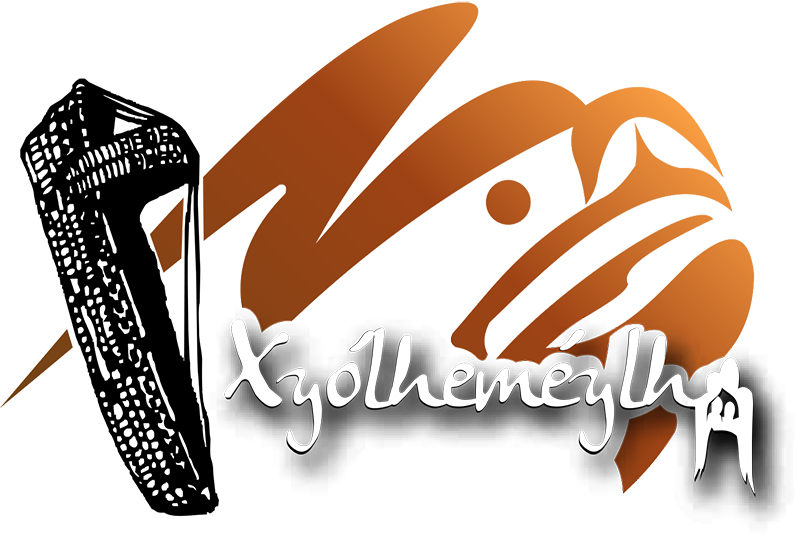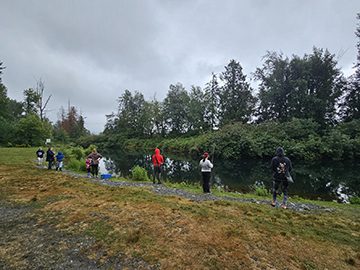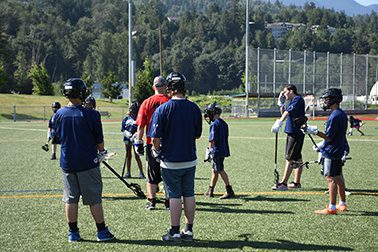Message from the board of directors
Fraser Valley Aboriginal Children & Family Services Society
Sqwélqwel - Xyólheméylh Summer 2024 Newsletter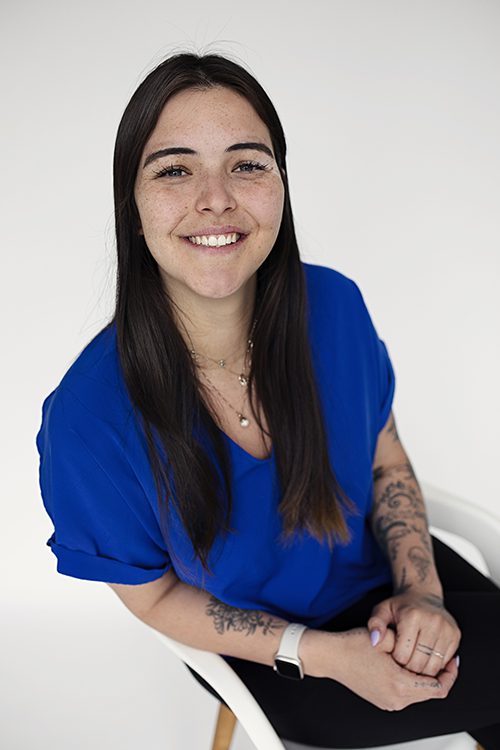
Board President Jade Victor
Xyólheméylh Board of Directors President’s Message
Ey Swayel – Good day. Welcome to our Summer Newsletter.
We are pleased to announce that we have hired Nazeem Ratanshi as Xyolheméylh’s Executive Director of Programs, effective July 15. Many will remember Nazeem from his time with Xyolheméylh from 2017 to 2019 as our Director of Practice. Since 2019, Nazeem has continued to grow his leadership skills as a Manager of Quality Assurance with MCFD, and as the Director of Operations and Integrated Practice with VACFSS. Nazeem also has a BSW and an MSW from UBC, and a BA in Criminology from SFU.
Nazeem brings with him in depth knowledge of practice, particularly as it relates to Indigenous children, youth, and families, and has strong leadership that we are confident will help Xyolhemeylh to achieve our goals in the coming years.
We are grateful to Rhea Del Vecchio for serving as the Acting ED of Practice and her willingness to step up and cover this position. Rhea has excelled within this position and provided great leadership during this period of transition. We know her leadership will continue as she returns to her Director role in the Youth and Guardianship basket.
During this transition period, we want to highlight our governance and operational goals:
Governance Goals:
Overarching statement: Weaving the work of the Board around Indigenous cultures to achieve the following goals:
#1 Continue to practice good Governance.
#2 Maintain accountability of the ELT through building relationships and collaboration.
#3 Strengthen Board visibility and relations throughout Xyólheméylh and communities.
Operational Goals:
#1 Support closing the socio-economic gap for Indigenous families and communities.
#2 Ensure adequate, feasible, and long-term organizational facilities.
#3 Ensure agency practice adheres to standard and exceeds community needs.
#4 Ensure a culturally aware workplace.
#5 Cultivate an organizational framework that is supported and sustainable.
We hope everyone is enjoying the summer and getting an opportunity to take some time off.
Temqethelmot - Jade Victor
Message from Executive Leadership Team
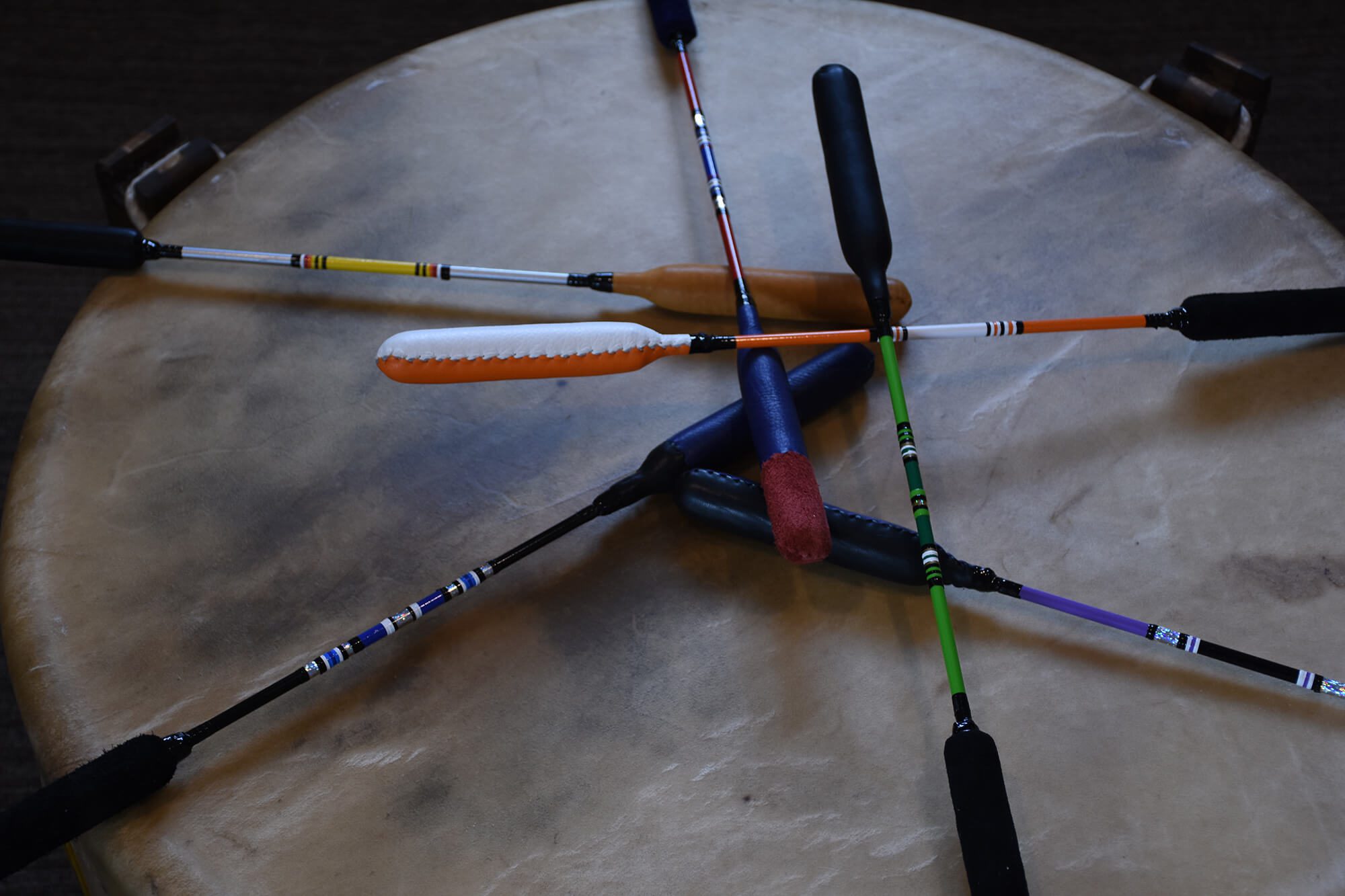
As a leadership team we are pleased to welcome back Nazeem Ratanshi, Xyólheméylh’s new Executive Director of Programs as mentioned above. We also want to acknowledge and raise our hands to Rhea Del Vecchio for her service as Acting Executive Director of Programs over this past year.
Additionally, we have recent updates regarding office location changes in Chilliwack intended to bring staff back together and increase collaboration and accessibility for families and caregivers. In July, our staff who support Urban Indigenous families moved to a new location on Nowell Street. This new co-location provides for our Family Services, Guardianship, FDR, and Resources teams to be together in service of our families while our Urban Indigenous Youth continue to be served at the Youth Hub on Main Street in Chilliwack. Our Chilliwack based Stó:lō team members, are now sharing space together at our office located at Spadina and Main Street in Chilliwack. We appreciate everyone’s patience during this transition, and we are grateful for your continued support.
We would also like to take a moment in this newsletter to acknowledge the report released on July 14th by the Representative for Children and Youth, titled Don’t Look Away: How One Boy’s Story Has the Power to Shift a System of Care for Children and Youth. This report follows a yearlong investigation into the tragic death of a young Indigenous child in care and highlights the stories of 14 other children from eight families who encountered similar challenges across various government systems.
Although this story is not specifically about our work at Xyólheméylh, leadership here is reflecting on the distressing information and recommendations for the need for reform and accountability across all systems intended to support children and families in BC. This report discusses topics that are incredibly challenging and will evoke strong feelings of loss, grief and disbelief regarding the care system that failed this young boy and his sister. We praise the work of the Representative for Children and Youth, for her resolve in honouring Colby’s life and providing insight about child protection and child welfare policies and programs, as well as broader social, health and economic policies that directly impact the lives of thousands of children in British Columbia.
In the coming weeks, we will be closely reviewing the Representative’s recommendations to determine how we, as Xyólheméylh, can contribute to continued change. Our commitment remains to focus on prevention, support growing family capacity, and collaborate with Indigenous communities to better support the children and families we serve. We extend our heartfelt thanks to Jennifer Charlesworth, the Representative for Children and Youth, for her dedication to children and youth and her insightful work on this report.
ELT – Nazeem Ratanshi, Rod Spitzig, and Laura-Dawn Wilkin
Medicine Teachings with Cynthia Myran
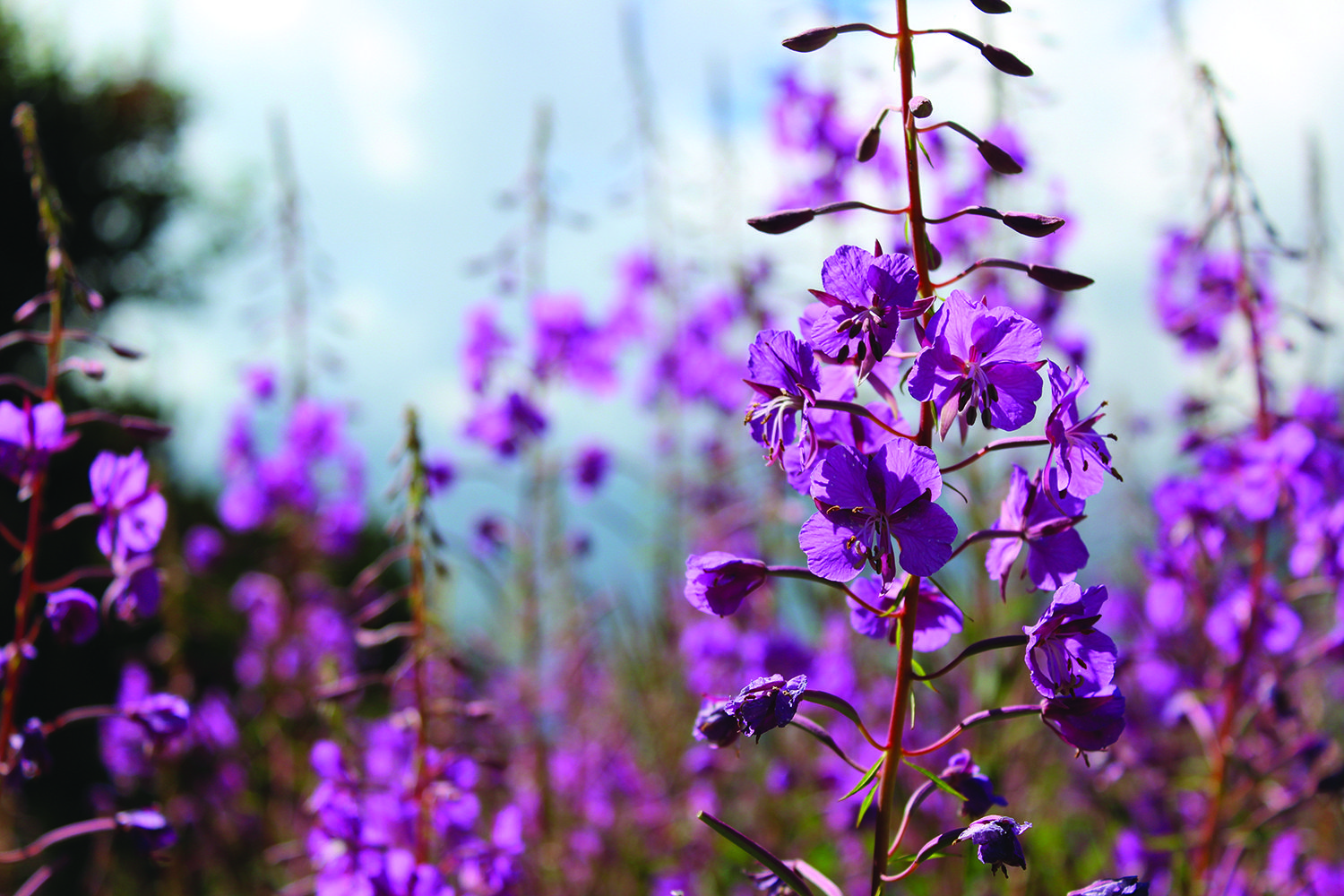
Bear Root
Bear Root is a root that bears eat when they first come out of hibernation. Cynthia Myran, Xyólheméylh Elder, says you have to go way up into the mountains for find bear root. It can be dried and used as a tea, a tincture or just chewing it. It is good for energy, tooth aches, an immune system builder, for heart and gut issues. It is also used in ceremonies, burned as a smudge or smoked in a pipe.
Red Clover
Cynthia Myran, Xyólheméylh Elder says she used to eat Red Clover as a kid. It has a sweet taste and grows in fields where clover grass grows. It was later on she found out it is a powerful medicine that can be used for weight loss, cancer and heart disease prevention, arthritis, asthma, whooping cough, bone loss and psoriasis. It also reduces symptoms of menopause.
Fire Weed
Fire Weed (pictured above) are the purple flowers that grow along highways and a medicine that is rarely talked about, says Cynthia Myran, Xyólheméylh Elder. It can be used as a salve or made into a tea. It is a strong pain reliever, helps fight cancer, arthritis and is a good medicine for men and the prostrate.
Seneca Root
Seneca Root is a common ingredient used in cough syrup. It is good for coughs, colds, asthma, loosening phlegm, and helps induce sweating. Cynthia Myran, Xyólheméylh Elder warns that it is also a laxative and shouldn’t be drank too often.
- Teachings from Elder Cynthia Myran
Meet an elder: greg poitras

Greg Poitras is passionate about helping people get their feet on the ground and to be proud of themselves. “We have to love ourselves first, the heart must be open to you as a person so it can open itself up to others,” says Greg.
Greg was one of the Elders for the Xyólheméylh Men’s Wellness Group and he talks about one man that he helped through mentoring. When Greg met him the man was struggling, he was separated from his family with only short visiting privileges to his children. He’s now back with his wife and children. “That is my purpose, to bring people along, to sit with them, hug them and make them look in the mirror every morning and say ‘I love you.’ We have a bond that will be around for a long time,” says Greg
Greg’s father was Métis from Lebret, Saskatchewan and his mother was Norwegian. He was actually born in an Indian residential school with nuns delivering him because there was a snowstorm, and they couldn’t make it to the hospital in Regina.
Greg grew up in a family of four kids, with strong values, respect for Elders and a strong sense of community. He had many aunts, uncles and cousins, one of whom was the late Gil Poitras who was a beloved Elder with Xyólheméylh. Unlike Gil, he didn’t grow up learning to smudge, but he grew up jigging.
“When I was young, I never walked anywhere, I jigged,” says Greg. “I was always around music. My father could speak English, French, Cree and Mitchif, but he never taught me those languages because back in those days, we were the dirt under people’s shoes,” says Greg. The family eventually moved to BC in 1955 which is where Greg grew up. He says there was less discrimination in BC. “The racism didn’t go away, but it wasn’t in your face all day, every day.”
Greg loves to laugh and sees humour as the best medicine. “I like to be transparent, I like to believe I’m a better healer than I am a hurter,” says Greg. He also sees himself as a problem solver, which is reflected in how he spent his working life.
He was a sheet metal worker by trade until he had an accident, falling 32 feet. He retrained as a safety and security officer and worked with the federal government on the Canadian coast guard, western region. He was flying 175,000 air miles a year and jokes that he was on a first name basis with many airport workers across Canada. He worked on the waterfront for many years before returning to sheet metal as a foreman. He was also an organizer with the Louis Riel Métis Society.
Greg has been married to Barb for 52 years, with one son and three daughters, eight grandkids and one great grand kid. “We are very blessed. They all live locally. I’m very fortunate. My strongest values that were instilled in me that I’ve instilled in my kids is that it’s about family, respect for Elders, and to be polite. I have strong sense of community,” says Greg.
Meet a Caregiver: Clover Bayley
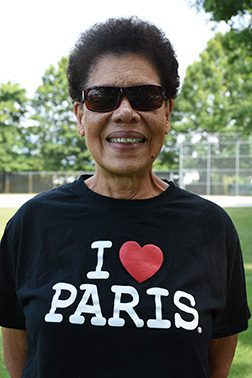
When Clover Bayley was growing up in Jamaica she lived in a house full of children that weren’t her siblings. One of four siblings, her mother, who was a teacher, would take in kids who left their homes or were kicked out because they were unmanageable. Clover says there wasn’t really a child welfare program in Jamaica at the time, it’s just what people did for their community. “It was natural, it’s just something people did. People would help out where they could,” says Clover.
She eventually moved to Toronto in 1970, went back to Jamaica for a time in 1980, and has lived in BC since 1993. Clover grew up knowing that she wanted to have lots of children, but didn’t have a partner, so decided to become a foster parent and has been one since 2006.
In the 24 years of being a caregiver/support parent with Xyólheméylh, she has cared for numerous children and is still connected to most of them in some way or another. She has four adopted children – two Jamaican and two Canadian, and currently has six children in her care, ages three to 15. They are from three sibling groups.
“Nothing I have done has given me this much satisfaction,” says Clover. She believes that it is her job as a support parent to help facilitate family connections. “They won’t always be living with me,” says Clover. “You have to try and strengthen that bond.”
She also believes it’s important for the children to be exposed to their culture. “You need to know your heritage and culture,” says Clover, but she also wants to raise children to be citizens of the world.
Clover and other caregivers make a huge difference, offering safe and loving homes. We lift our hands to Clover and all the Xyólheméylh caregivers. If you are interested in becoming a caregiver we have info sessions the second Wednesday of the month at 6:30 pm and the third Tuesday of the month at noon. Contact Norma Commodore at: [email protected] to register.
Community Profile: Squiala First Nation
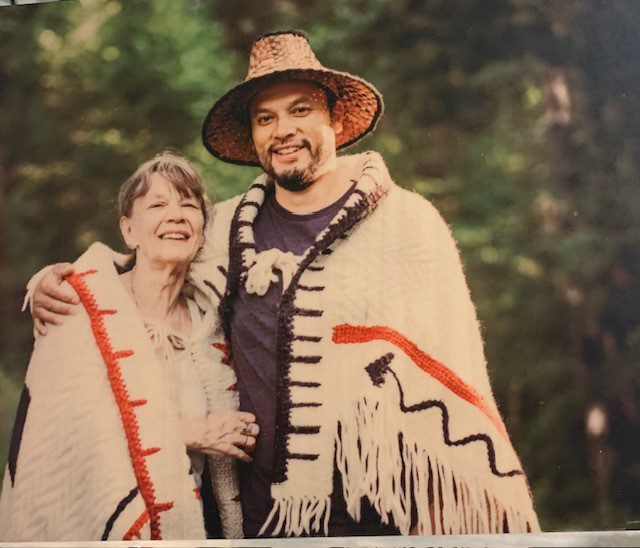
Pictured above: Tammy Bartz and her son, Chief David Jimmie
For Squiala First Nation, prevention programs for its members are a priority. The guiding principles are that the programs must be for everyone and that if youth are kept busy doing activities they love, they are less likely to get into trouble with drugs and alcohol. Squiala First Nation is placing an emphasis on the health and wellness of their community members, says Tammy Bartz, Designated Representative, and Board member with Xyólheméylh. “We have a lot of people in our community who don’t have a lot of money and wouldn’t be able to afford to do these things, so it’s a way of supporting families in a healthy way, building the confidence of the youth and making good memories.”
Squiala has been running prevention programs since 2014 and funding them from their own source revenue which comes from Eagle Landing taxation. For the last couple of years, with prevention money from the federal government, they have been able to divert that own source revenue to other projects, such as planning to install air conditioners in all their rental units and building a barbeque area with a covered area for community members to use. The prevention money also pays for counselling services for their members. The latter includes paying for therapists, and a variety of therapeutic modalities such as equestrian therapy, water therapy, grief and loss therapy and addictions and PTSD programs.
This year alone they have held 17 community events including hiking, skiing and snowboarding, various family events such as BBQs, tickets to baseball games and more. They also allot $750 per person in the community for sports and recreation fees which could include anything from hockey to music lessons and another $250 for equipment. “This guarantees that everyone in the community has the opportunity to participate in sports and recreation activities,” says Tammy. “Whatever is going to help them have a better quality of life, we support it.”
In addition to ISC funding for post-secondary education, Squiala also supports members who want to train for a trade. That can be anything from training in heavy equipment, massage, or hair dressing. Tammy says that sometimes community members will change careers later but taking the initial step in a training program is about building confidence. “Whatever peoples’ interests, and if it’s something they want to do, then we will support them.” It gives them pride in themselves and also gives them the means to support themselves.
The philosophy seems to be working for the community. “We’re not seeing a lot of our young people in trouble or walking down the wrong path,” says Tammy. “I really think it’s making a difference for our youth.”
In other news at Squiala First Nation, Tammy’s son, Chief David Jimmie was recognized by the City of London in England, along with Tzeachten First Nation Chief Derek Epp, earlier this summer. Both men, along with Chief Donald Maracle of the Mohawks of the Bay of Quinte, were presented with keys to the city of London for their work in building relations with the UK government. It was the first time in 350 years that the award has been given to First Nations members.
an intro to colonization
In this video Rupert Richardson gives an introduction to colonization. Rupert is from the Guskimukw, Nuxalk, and Chippewa First Nations. He is a PhD candidate at UBC and has worked in the field of education for 15 years. His research and community engagement centres around intergenerational healing, decolonization and post-secondary education.
Meet a Board Member: Marcella Sunshine
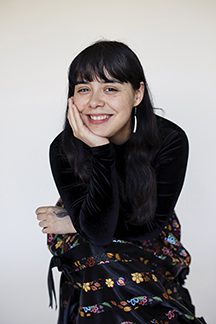
Marcella is the third generation of her family to have grown up in government care. She met her birth giver, Natasha Sunshine, for the first time in 2022 and her great grandmother in 2023.
Fueled by this lived experience, Marcella is currently running a province wide cultural revitalization project called VYPER- Visionary Youth Peers for Equity & Revitalization, funded by the Public Health Agency of Canada. She is also completing her BA at University of the Fraser Valley in Indigenous Peoples Knowledge and Political Science.
Marcella’s great grandmother watched all of her children get taken away during the ‘60s Scoop and wanted a different life for her kids. Being a board member is a commitment to Marcella because it captures her grandmother’s wish to see all Indigenous children free from cultural and familiar poverty.
“No matter how many skills programs, financial support, or other activities are in place, it doesn’t begin to match the healing and identity that comes from access to your culture and story. That story is what creates us, and when we know our story, through and through, we can begin to take lead of its narrative,” says Marcella. “I remember when I began truly being connected to the culture, it was a mix of having relevant cultural experiences and being accepted somewhere- where I belonged. That’s what my goal as a board member is for the youth and families we serve.”
The ability to braid two worlds together is very important to Marcella. “In one world we use western medicines, communication styles, the practice of social work, which is not rooted in Indigenous ways of being or doing- and in our other world it’s our traditional lives. It’s about always trying to lead by teachings and how they shape our interactions and work with people. It’s going to ceremony and healing in ways that are not just based on cognitive styles of practice. It’s spiritual, and I hope through my time with Xyólheméylh we can continue to reflect and influence this critical way of being into the work,” says Marcella.
She remembers listening to a podcast recently, (Indigenous Medicine Stories: Anishinaabe mshkiki nwii-dbaaddaan) where the speaker went on to describe how a lot of the systems we are involved in and the western style of therapy are in place to acknowledge, recognize and work through newer elements of harm that are affecting us and our families, such as Indigenous child welfare and problematic mental health. “We are learning how to navigate these day-by-day - we just need to ensure we do our part by keeping each other and ourselves accountable, honest and brave. I hope to continue to influence these thoughts into the board and with the people we work with. I also believe kindness goes a long way too.”
In Marcella’s spare time she does pow wow dancing (Fancy Shawl) and travels the pow wow trail. “Last year I spent every weekend for two and a half months in different Nations dancing, visiting and growing my family connections. That was one of the best summers,” says Marcella. She also enjoys making music on the guitar as well as electronic, sewing and creating regalia, and practicing Taekwondo. In 2019, she made a goal to spend one year learning a new skill. Next on the list is DJing.
Jam and bannock workshops and a recipe
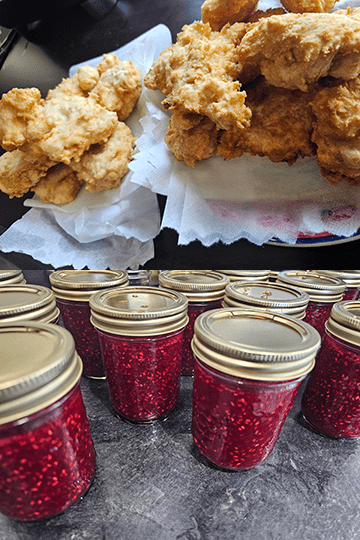
On July 17, a small group of youth got together in Abbotsford to make bannock and jam. The recipes are from Xyolhemeylh's Youth Programming Coordinator, Raven's Little, as shared by her family.
Easy Bannock Recipe
Ingredients:
- 2 Cups of Flour
- 2 tsp Baking Powder
- 1 tsp Salt
- (Optional- 1 tsp sugar)
- Approx ¾ C warm water
Mix dry ingredients together in a bowl, in the center slowly mix in approx. 3/4C of warm water. Do not over mix. Overmixing can create tough Bannock!
Form flat round pieces and add to hot oil. Fry til golden brown on both sides. Remove from oil and let cool, Enjoy!
Canning Raspberry Jam
Ingredients:
- 10 Cups Fresh Raspberries
- 7 Cups Granulated Sugar
- 3 Tbsp Lemon Juice
- 1 Box Certo Pectin Powder
Directions:
- Inspect and wash Jars in hot soapy water. Rinse well. Keep Sanitized in warm oven til needed.
- Prepare your canning pot , fill a water bath canner with water and put on the stove to boil. It should be ready to use after you have finished making your jam.
- Wash Raspberries
- Smash Raspberries in layers in a big pot. Approximately 10 cups of fresh berries equals 5 Cups smashed.
- Add pectin and stir well.
- Turn stove to medium-high and stir as mixture heats up
- Once it comes to a rolling boil, add sugar and lemon juice . Boil for one more minute.
- Remove Jam from heat and continue stirrying another 5 minutes. Skim away any foam that accumulates on the surface.
- Carefully ladle into hot jars. Wipe the rims with a clean cloth. Cover twith lids. Make sure rings are snug but not too tight.
- When Water bath is at full boil, lower jars into the boiling water using the rack and oven mitts (ensure jars are covered in one inch of boiling water) and process for 10 mins)
- Remove from water using the Jar tongs carefully place on counter. Let cool. Check seals, and refrigerate any lids that have not sealed.
visions and voices summer events
Visions and Voices has been busy the past few months. They organized a Lacrosse program running this summer for kids ages 6 to 16, held a bowling tournament in Abbotsford on July 16; a first aid workshop in early July and on June 8 they held a Celebrating Youth Event which included games, water slides and prizes. On July 30 and Aug. 15 we held Learn to Fish events at the Abbotsford Trout Hatchery.
upcoming events
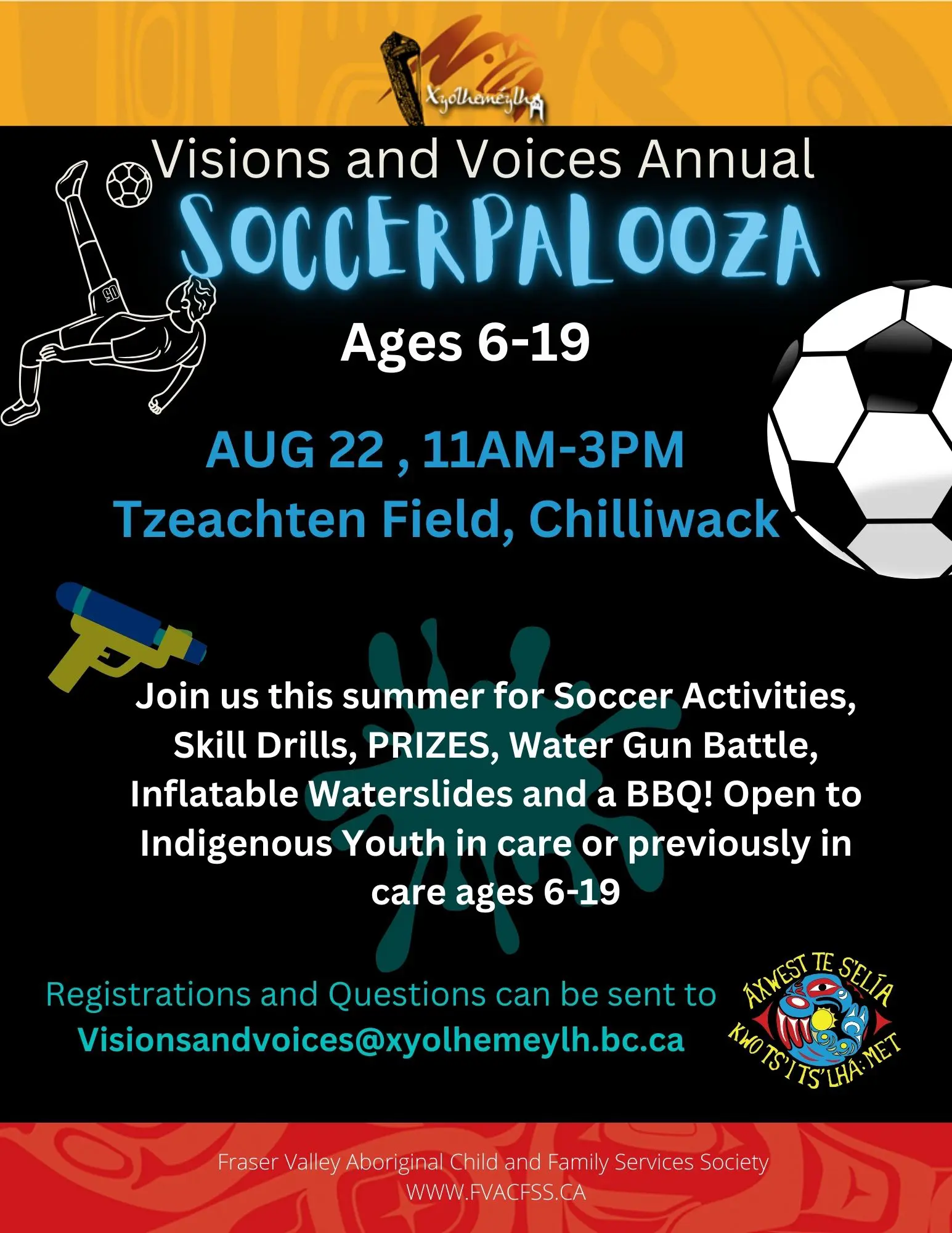
upcoming events
